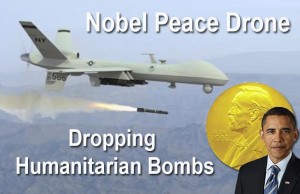 |
NEW YORK (25 October 2013) – Two United Nations human rights experts today expressed concern about the potential illegal use of armed drones. In two separate reports to the UN General Assembly, the experts called upon States to be transparent in their use of drones as weapons, to investigate allegations of violations of the right to life through drone killings, and to respect all applicable international law standards.
The UN Special Rapporteur on counter-terrorism, Ben Emmerson, focuses his report on the use of armed drones in counter-terrorism operations and its civilian impact. The UN Special Rapporteur on extrajudicial killings, Christof Heyns, analyses in his report the use of lethal force through armed drones from the perspective of the right to life and international norms in this regard.
Civilian impact and the right to life
“I urge States to declassify, to the maximum extent possible, information relevant to their lethal extra-territorial counter-terrorism operations and to release its own data on the level of civilian casualties inflicted through the use of drones,” the UN expert on counter-terrorism said.
Mr. Emmerson is currently investigating the use of drones in lethal extra-territorial counter-terrorism operations to evaluate allegations that the increasing use of drones has caused disproportionate civilian casualties
“The right to life is widely regarded as the ‘supreme right’. Armed drones are not illegal, but as lethal weapons they may be easily abused and lead to unlawful loss of life, if used inappropriately,” the UN expert on extrajudicial killings said.
“If the right to life is to be secured in the use of drones, it is imperative that the limitations posed by international law on the use of lethal force, as for any other lethal weapon, are strictly adhered to and not weakened by broad justifications of drone strikes,” Mr. Heyns emphasized.
Legal issues
“Both States using drones and States on whose territory drones are used have their own obligations to respect international standards and prevent violations,” Mr. Heyns pointed out, while emphasising that “the legal framework for maintaining international peace and the protection of the right to life is a coherent and well-established system.
“There is no need for new law,” the human rights expert says in his report, cautioning against the wide and permissive interpretations of the current international rules and standards.
The UN expert on counter-terrorism noted, “there are a number of legal questions on which either no clear international consensus, or where current practices and interpretations appear to need further discussion.”
“There is an urgent and imperative need to seek agreement between States on these issues,” Mr. Emmerson said, as he explained to the UN General Assembly the main areas of controversy and the competing arguments.
Accountability and transparency
In their reports, both experts stress the crucial importance of transparency and accountability obligations of States, and offer concrete recommendations to the international community in this regard.
“The single greatest obstacle to an evaluation of the civilian impact of drone strikes is lack of transparency”, Mr. Emmerson said. “In any case in which civilians have been, or appear to have been killed, the State responsible is under an obligation to conduct a prompt, independent and impartial fact-finding inquiry and to provide a detailed public explanation.”
“States must be transparent about the development, acquisition and use of armed drones. They must publicly disclose the legal basis for the use of drones, operational responsibility, criteria for targeting, impact (including civilian casualties), and information about alleged violations, investigations and prosecutions”, Mr. Heyns urged.
(*) Check the full reports:
· Counter-terrorism: http://ap.ohchr.org/documents/dpage_e.aspx?m=134
· Summary executions: http://ap.ohchr.org/documents/dpage_e.aspx?m=96
ENDS
Ben Emmerson (United Kingdom) is the Special Rapporteur on the promotion and protection of human rights and fundamental freedoms while countering terrorism. On 1 August 2011, he took up his functions on the mandate that was created in 2005 by the former United Nations Commission on Human, renewed by the UN Human Rights Council for a three year period in December 2007, in September 2010 and again in March 2013. As Special Rapporteur he is independent from any Government and serves in his individual capacity. Learn more, log on to: http://www.ohchr.org/EN/Issues/Terrorism/Pages/SRTerrorismIndex.aspx
The Special Rapporteur on extrajudicial, summary or arbitrary executions, Christof Heyns (South Africa), is a director of the Institute for International and Comparative Law in Africa and Professor of Human Rights Law at the University of Pretoria, where he has also directed the Centre for Human Rights, and has engaged in wide-reaching initiatives on human rights in Africa. He has advised a number of international, regional and national entities on human rights issues. Mr. Heyns’ research interests include international human rights law and human rights law in Africa. Learn more, log on to: http://www.ohchr.org/EN/Issues/Executions/Pages/SRExecutionsIndex.aspx
